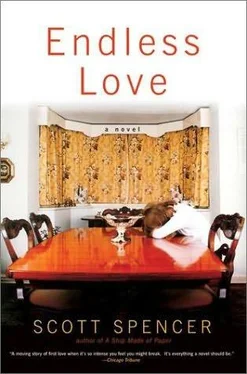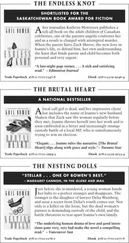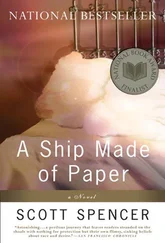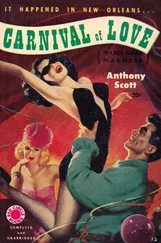I watched her walk across the visitors’ room, toward the glass doors. Her shoulders were back and she was trying not to walk fast. In a moment she’d be gone.
“Thank you,” I called out to her, cupping my hands over my mouth like a man at sea.
She raised her hand without looking round. She waved goodbye with her fingers, lowering them one at a time, as if counting down. Five, four, three, two, one.
The next September my father died, at home, in his sleep. A massive heart attack, though I don’t know if it would have taken a huge shove to loosen his grip on life. As soon as he was gone, it was clear to me that he’d been preparing his own death since Barbara Sherwood’s. Rose came to Fox Run to break the news. We were alone in the visitors’ room, on a Wednesday. Her face looked utterly white, as if she were hovering in a state of semi- shock: there are windows in the wall separating life from death and when you peer through one of them it changes you. I knew something was wrong as soon as I sat next to Rose, and when she laid her cold, small hand on my wrist I was ready for the worst. It was already three days after the fact: Arthur died at eleven thirty Sunday night; his body, as per his promise, was already in the University of Chicago Medical School, “donated to science.” I felt too neglected, too behind the roll of events to cry. I felt only a deep soreness within, as might be caused by a disease.
A month later I was given a round of psychological tests. Nothing new. Adding columns of numbers. Who was the first President of the United States? What is the sun? Questions to see if my brains were addled, if my hold on reality was at all sequential and ordinary. Inkblot tests, complete-the-story tests, spatial perception tests, memory exercises, and finally a kind of Ph.D. oral in front of a panel of three psychiatrists, in which I spoke of myself and answered their questions. If you could have any job in the whole wide world, what would it be? If you loved a gal and she didn’t love you, what would you do? I was weak from the effort to appear normal, and I had even forced myself up toward a level of acuity in which I recognized that if my efforts were too apparent—or too successful—then I would be defeating myself. It was important to remain at all times vulnerable to their judgments of me; confidence and determination would be interpreted as symptoms of disassociation.
Two weeks after my round of tests, I was informed by Dr. Donner, who was supposed to be my psychiatrist, though I only saw him an hour and a half weekly, that I was fit to “take a crack” at being in the world again. He gave me several words of friendly advice, said I should “think seriously” about seeing a psychiatrist once I was released, that I should “feel free” to call on him if I had a problem I wanted to discuss, and that he hoped I’d learned about myself and how to deal with my problems while I was at Fox Run. “Especially with the hospital under constant attack by intolerant community people and opportunistic budget-cutters, it feels fine to be sending someone home with the feeling that we’ve done him a measure of good.”
And so I was released. I left Fox Run, walking across a bridge made of your marriage and Arthur’s death. I returned to the old apartment on Ellis, to recover from my long hospitalization and adjust to my freedom. I’d been through it all before, but what made it different was now I hadn’t the slightest illusion that everything might be transformed suddenly by the huge unreasonable magic of Reunion. I never once expected to see you from my window, even as I got out of the bed I’d slept in when I first joined my heart to you, the bed I had lain in in agony, waiting to rejoin you. When the phone rang I never thought it was you and the sight of the mailman shouldering his big leather pouch of letters and cards never tempted me to even wish. Arthur’s small estate had gone to Rose, but she divided it in half and so I was, for the first time in my life, solvent. Now, I could move out whenever I was ready, but I wasn’t ready. I needed to be home and Rose needed me there, too.
Jade. I don’t want to say it, I truly don’t…
It was difficult to find a job. I had a criminal record and it was worse for me to have been punished in a hospital than in a prison, in terms of how other people looked at me. I had very little education and not much of a work history. I was close to twenty-eight years old. I wanted a job in a large company, something to put me in contact with many people. Friends of the family tried to help but no one had anything for me; everyone was retired or simply too old to have much influence. I lived on my small legacy and took courses at Roosevelt University. It doesn’t matter what I took, though it wasn’t astronomy. I needed something that I was sure would help me find work and everyone told me that astronomers were having a very hard time of it.
On the good days, I felt like a shipwrecked man spotting the signs of some nearing but still invisible shore: a taste in the wind, a softness in the light, a sudden passage of gulls.
I hope this day finds you well. You don’t have to read a word of this, you know. I don’t want to make your husband nervous, or to embarrass you, or to make you remember things you’ve decided are best forgotten. I’ve come to the end, finally. Not of love. But of my power to say another word. I’ve no more need. My life is taking shape. I’m living with a woman and maybe someday we will marry, though I doubt it. She paints, too, by the way. Even better than you used to. She teaches at a university and is a full inch taller than I am. I won’t bother to tell you where I’m living now; it makes a more perfect sense for you not to know.
I don’t want to say it, I truly don’t, but if you’ve gone this far I suppose it’s obvious that what was ignited when I loved you continues to burn. But that’s of small importance to you now, and that’s how it should be.
Everything is in its place. The past rests, breathing faintly in the darkness. It no longer holds me as it used to; now I must reach back to touch it. It is night and I am alone and there is still time, a moment more. I am standing on a long black stage, with a circle of light on me, which is my love for you, enduring. I have escaped—or have been expelled—from eternity and am back in time. But I step out once more to sing this aria, this confession, this testament without end. My arms open wide, not to embrace you but to embrace the world, the mystery we are caught in. There is no orchestra, no audience; it is an empty theater in the middle of the night and all the clocks in the world are ticking. And now for this last time, Jade, I don’t mind, or even ask if it is madness: I see your face, I see you, you; I see you in every seat.
A Biography of Scott Spencer
Scott Spencer is the New York Times —bestselling and award-winning author of ten novels, including the National Book Award finalists Endless Love (1979) and A Ship Made of Paper (2003).
Born in 1945 in Washington, D.C., Spencer moved with his family to the South Side of Chicago at age two. His father, Charles, had been in the army before beginning work in a hot and noisy Chicago steel mill. Charles later wrote and self-published a book titled Blue Collar (1978) about the experience. Spencer remembers his childhood as peaceful despite his family’s tight finances and his parents’ concern over the political climate during the McCarthy Era, both of which were kept secret from Spencer at the time. Charles was a dissident in his union and, Spencer remembers, “sometimes feared for his safety and even his life. There were mornings when he checked under the hood of his car for a bomb before igniting the engine.” The far South Side of Chicago was at the time the set of atrocious racial violence, which Spencer’s parents steadfastly resisted, adding to the home’s sense of peril and purpose.
Читать дальше












